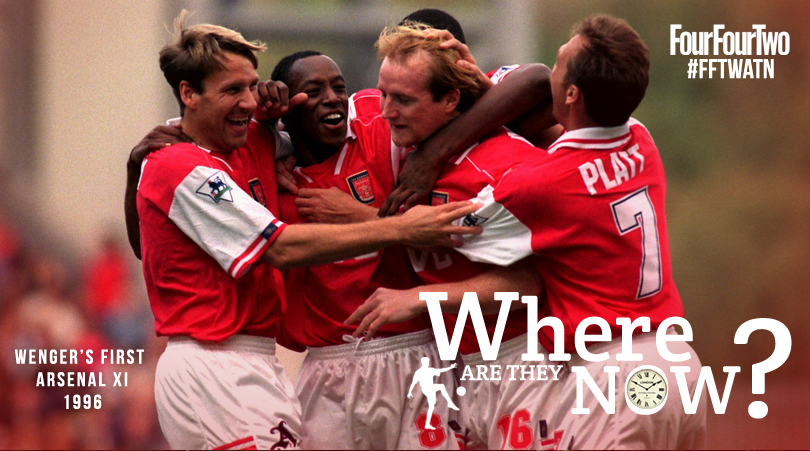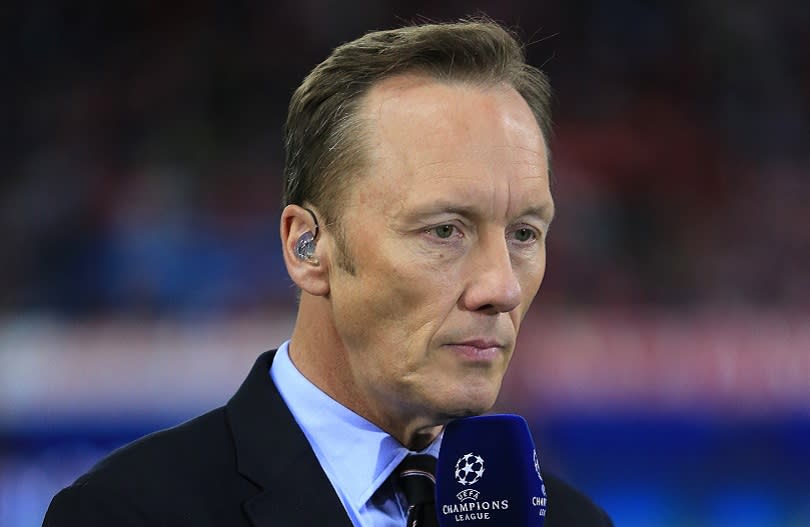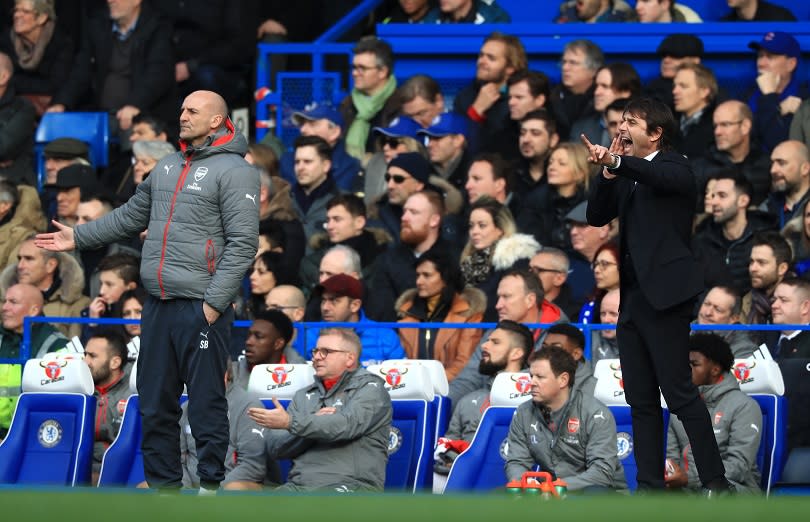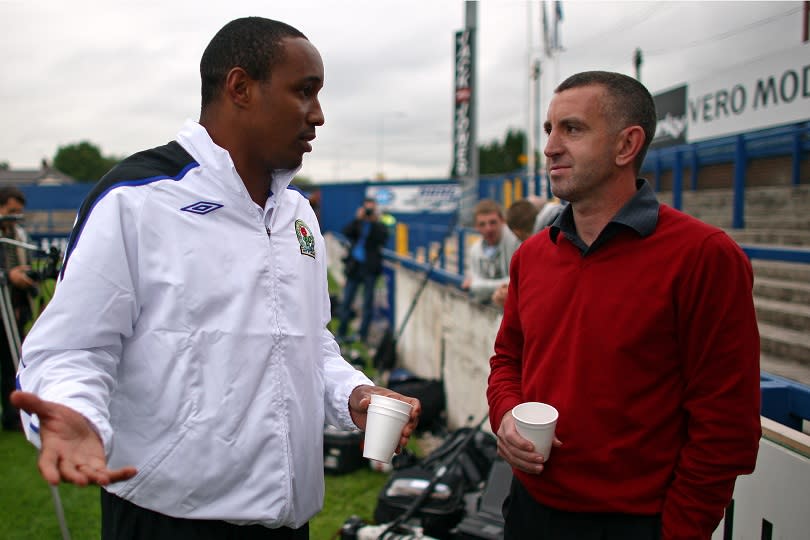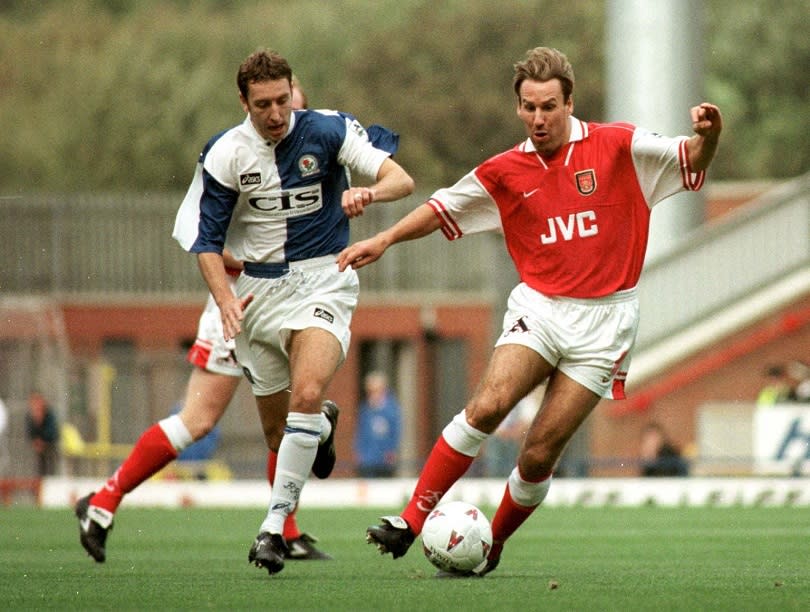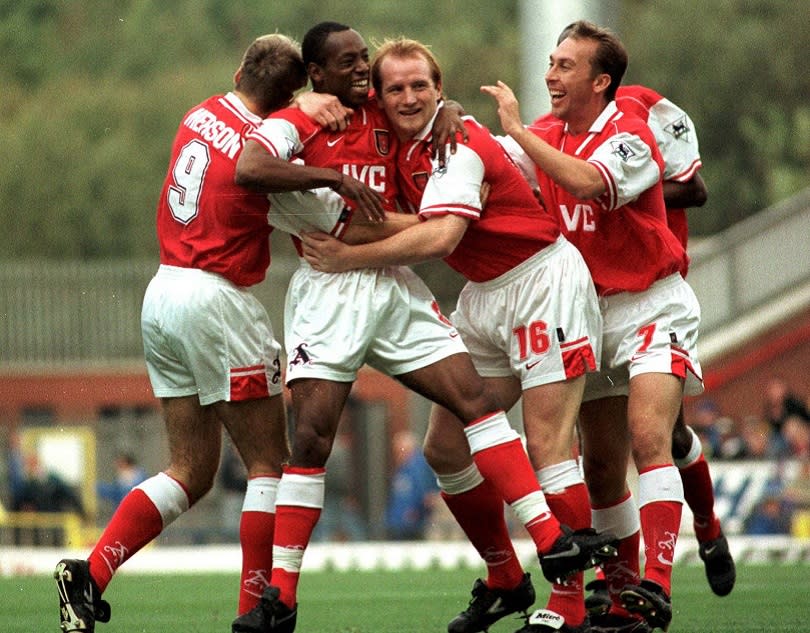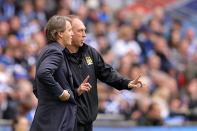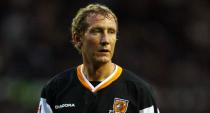Where are they now? Arsene Wenger’s first Arsenal team, October 1996
Arsene Wenger chose not to tweak Arsenal's starting XI for his first game in charge – a 2-0 win at Blackburn in October 1996 – but upset the players by summoning them to the hotel ballroom at 8.30 on the morning of the game for an unheard of warm-up and stretching session.
He also banned the usual pre-game chocolate bars, leading to a protest on the coach on the way home from the game. He got them onside eventually, though, and we all know what happened next (y'know, before the suggestions of club-killing and #Wexit protests).
Here's who started the Frenchman's Arsenal opener...
David Seaman
The mustachioed goalkeeper was a firm favourite among Arsenal fans, having signed from QPR in 1990. He played a key part in their success under George Graham earlier in the decade, and furthered his reputation by saving three penalties in the Cup Winners’ Cup semi-final shootout with Sampdoria, despite playing with two cracked ribs.
That feat was tarnished somewhat by the last-minute 45-yard lob by Mohamed Nayim in the final of that competition, but Seaman’s stock was high again by the time Wenger arrived – he’d just been named in the Euro 96 Team of the Tournament, and his facial hair was thick and lustrous.
Seaman missed large chunks of that first season with injury, but was undisputed first choice throughout his time under Wenger, ultimately playing more than 400 games for Arsenal before leaving to join Manchester City in 2003. Since retiring in 2004 at the age of 40, he’s won a series of Dancing on Ice, briefly captained a team on They Think It’s All Over, and kept goal for England in six Soccer Aid matches.
Lee Dixon
George Graham’s greatest gift to Arsenal was that fabulously mean defence, so well synchronised in the offside trap that it was like watching a Seaman routine on Dancing on Ice. At right-back for this first game was the dependable Dixon, who'd been with the Gunners since joining from Stoke in 1988 and had already won two First Division titles, an FA Cup and the Cup Winners’ Cup.
Dixon remained first choice under Wenger until the Double-winning season of 2001/02, when he retired at the age of 38. Since then, he’s built a reputation as one of the better football pundits – first with the BBC and now with ITV – and also owns a restaurant and The Riverside Brasserie in Bray. He's even invested in a smartphone game called ‘I Am Playr,’ which allows users to live out the life of a footballer – although for the sake of playability, hopefully not Dixon himself.
Steve Bould
Another defender poached from Stoke – maybe if Wenger had done more of that he wouldn’t be in this current mess – Bould was also part of Graham’s famous back four. He signed in June 1988, but when Wenger arrived to replace Bruce Rioch he was 34 and many expected him to leave the club and make way for Martin Keown.
Instead, Wenger opted to deploy five at the back for much of that first season, and Bould played a key part in Arsenal’s Double-winning campaign of 1997/98 before leaving to join Sunderland in the summer of 1999. After retiring, he did his coaching badges and immediately returned to Arsenal – working first with the academy, and since 2012 as Wenger’s assistant manager.
According to Ray Parlour, Bould once ate nine dinners during an eating competition on the coach back from Newcastle.
Tony Adams
A few weeks before Wenger’s arrival, Adams finally admitted to the world that he was an alcoholic. The defender, who’d joined Arsenal as a teenager and never played for anyone else, had been struggling with the disease since the mid-1980s, and even admitted playing a match while drunk. Wenger stuck by the club captain, though, and his changes to the diets and lifestyles of Arsenal players were undoubtedly a positive influence on Adams. He captained the Gunners to two league and cup doubles, before retiring at the end of the 2001/02 campaign at the age of 36.
Adams tried to forge a career in coaching after his playing career ended, taking charge of Wycombe Wanderers in November 2003 but proving unable to save them from relegation, which led to his resignation the following year. He then joined Portsmouth as Harry Redknapp’s assistant, and was appointed manager of the club after his former boss's departure, but collected just 10 points from 16 games and was sacked in February 2009.
Adams went on to spend 18 months in charge of Gabala FC in the Azerbaijani Premier League, where he currently works as a sporting director. Perhaps his biggest post-career legacy, though, is the Sporting Chance Clinic – a charity which helps sportspeople struggling with addiction.
Martin Keown
The defender joined Arsenal as a schoolboy, but played for Aston Villa and Everton before being re-signed by the Gunners in February 1993. He was always up against Bould in the battle to partner Adams at the heart of Arsenal’s defence, but played alongside both in Wenger’s first game in charge and for much of the 1996/97 season.
He stayed with the Gunners until 2004, but made just 10 league appearances in that final campaign before brief spells at Leicester and Reading. Nowadays, Keown is best known as a pundit, with his reasonable tone somewhat at odds with his manner on the pitch; he’s also dabbled in management and had a brief spell as a coach for Oxford University.
Nigel Winterburn
The final member of Graham’s legendary defence also remained part of Wenger’s plans for his first few seasons at the club, and was an integral member of a backline which conceded just 33 Premier League goals when winning the title in 1997/98.
Winterburn was first-choice left-back until 1999/2000, when he was displaced first by Sylvinho and then by Ashley Cole.
After leaving Arsenal, the former Wimbledon player crossed London again to join West Ham, where he spent three years before retiring in 2003. Since then he’s largely been out of the public eye, spending a short time as a defensive coach at Blackburn and picking up occasional punditry work.
Paul Merson
Like Adams, Merson struggled with addiction before Wenger’s arrival at Arsenal – in late 1994, he spent three months in rehabilitation for alcohol, cocaine and gambling problems. The creative midfielder returned to the side under Bruce Rioch in February 1995, and played regularly for Wenger in his first season at Highbury. However, at the end of that campaign, Merson was sold to Middlesbrough for £4.5m – turning down a new two-year contract with the Gunners.
"People thought I was mad to leave Arsenal for Boro, but they were mad to think it," he said later. "I joined a club that wanted me, a club going places, and it wasn't for the money – I actually took a pay cut to join them. It's not every day you have an opportunity to work with somebody like Bryan Robson, [so] it was a no brainer."
Merson helped Middlesbrough reach the Premier League, before spells at Aston Villa, Portsmouth and Walsall. He was appointed player-manager at the latter, suffering one relegation and narrowly avoiding another before being sacked.
After that, he played two games for Conference side Tamworth, before announcing his retirement in March 2006. Today, Merson is a regular pundit on Sky Sports' Soccer Saturday and writes a weekly column for the Daily Star.
Patrick Vieira
Bruce Rioch had been dismissed in the summer, but managerless Arsenal signed two Frenchmen before the start of the 1996/97 season – Remi Garde and a 20-year-old Patrick Vieira – on the recommendation of Wenger, who had yet to take over but was already starting to exert his influence.
Vieira, a strong and elegant midfielder, had already impressed and made his quality clear in Wenger’s first game in charge, when he was the only foreign player in the Arsenal starting line-up. He set up the Gunners' second goal, picking up the ball in midfield, striding forward and playing a delicious outside-of-the-foot through-ball to Ian Wright, who duly scored.
Vieira would go on to play 279 league games for the Gunners, winning three league titles and four FA Cups before leaving for Juventus in 2005. The Frenchman is currently manager of New York City, who he guided to a first ever play-off appearance in the 2016 MLS season.
David Platt
Highbury was the penultimate stop of a journeyman career for Platt, who had spells with Crewe Alexandra, Aston Villa, Bari, Juventus and Sampdoria. The midfielder was one of Bruce Rioch’s first signings and stayed in the team under Wenger, for whom he contributed four goals in 28 appearances.
The arrival of Emmanuel Petit the following summer limited his first-team opportunities, though, and Platt decided to take a year out of the game at the end of Wenger’s second season to study coaching. An unqualified Platt soon found himself in charge of struggling Sampdoria, with the Englishman forced to resign before the club were relegated.
Platt went on to have difficult spells with Nottingham Forest – where he also made a handful of playing appearances – and as England Under-21s manager. In 2010, he was appointed assistant boss to former Sampdoria team-mate Roberto Mancini at Manchester City, helping the club to their first league title in decades in 2012.
Platt’s most recent managerial job was at Pune City in the Indian Super League in 2015 – his team finished seventh out of eight, and he didn't return the following year.
John Hartson
The Welsh battering ram seems the antithesis of Wenger’s style of football these days, but he set up the first goal of the era, knocking a long ball from Winterburn into the path of Ian Wright. Hartson – then just 20 – was signed by George Graham a month before the Scot was sacked, and had slipped behind Dennis Bergkamp in the pecking order by the time Wenger arrived.
He was sold to West Ham for £3.2m in February 1997, with the arrival of Nicolas Anelka at Highbury imminent. Hartson's time at Upton Park was fruitful, and even saw him attract interest from Manchester United, but it was at Celtic where he really made his mark, with 88 goals in 146 games for the Bhoys. His last club was West Brom, with the frontman retiring in February 2008 citing struggles with his weight and fitness.
In July 2009, at the age of 34, Hartson underwent chemotherapy treatment for testicular cancer that had spread to his brain and lungs. At one point he had just a 50% chance of survival, but by December of that year he was told that the cancer had been virtually eradicated from his body. Hartson now works as a pundit for the BBC and fronts the John Hartson Foundation, raising awareness of testicular cancer and providing support to sufferers.
Ian Wright
Wright was 33 by the time Wenger arrived in north London, although he remained quick and deadly in front of goal – as he demonstrated with two well-taken efforts in this match. He’d been Arsenal’s top scorer every year since joining from Crystal Palace, but was so unhappy under Rioch that he handed in a transfer request.
The striker left the club in the Double-winning summer of 1998, after a hamstring injury had ruled him out for much of the campaign. After leaving Highbury, Wright had brief spells at West Ham, Nottingham Forest, Celtic and Burnley, before retiring from playing in 2000.
He’s since forged a successful media career, which has included guest hosting Top of the Pops and a stint as a team captain on They Think It’s All Over. He writes a regular column for The Sun, and generally provides an excitable voice and amusing headwear while doing punditry for the BBC and BT Sport.
Ray Parlour (sub)
On paper, Parlour wasn't set to succeed under Wenger – he'd been in and out of the side already, and had a number of disciplinary problems. However, the Frenchman's arrival transformed the midfielder, who remained a key member of the side for many years.
Parlour came on for Hartson in the last five minutes of this game, before becoming a regular starter in the centre of midfield or on the right side in subsequent weeks. He starred in the Double-winning teams of 1998 and 2002, before leaving Arsenal for Middlesbrough on a free transfer in 2003.
Following a brief stint at Hull, the ex-England international hung up his boots four years later. Since retiring, he's become a regular pundit on talkSPORT, and was one of a number of former professionals – including Keown and Seaman – who came out of retirement to play for Wembley FC in the 2012 FA Cup.

 Yahoo Sport
Yahoo Sport 






































